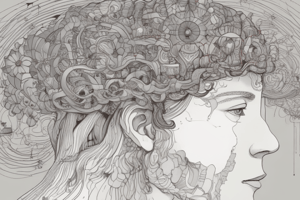Podcast
Questions and Answers
What is the primary focus of cultural relativism?
What is the primary focus of cultural relativism?
- Understanding and respecting cultural differences. (correct)
- Evaluating cultures based on universal standards.
- Imposing one’s own culture on others.
- Promoting ethnocentrism to maintain cultural superiority.
Which theory of self-development emphasizes the importance of social interactions, particularly in childhood?
Which theory of self-development emphasizes the importance of social interactions, particularly in childhood?
- Cooley's Looking-Glass Self
- Goffman's Dramaturgy
- Freud's Psychoanalytic Theory
- Mead's Theory of the Self (correct)
What is considered a master status?
What is considered a master status?
- A temporary position held by an individual.
- A status that is equally important as other statuses held by an individual.
- A status that overshadows all others and defines one's identity. (correct)
- A social position that comes with multiple responsibilities.
Which of the following best describes culture shock?
Which of the following best describes culture shock?
In the context of socialization, what is the role of primary agents?
In the context of socialization, what is the role of primary agents?
Which approach examines larger societal trends and structures?
Which approach examines larger societal trends and structures?
What is the primary focus of sociology as a discipline?
What is the primary focus of sociology as a discipline?
Which aspect is NOT a component of the scientific method used in sociology?
Which aspect is NOT a component of the scientific method used in sociology?
What does the sociological imagination help individuals understand?
What does the sociological imagination help individuals understand?
Which of the following theorists is associated with Functionalism?
Which of the following theorists is associated with Functionalism?
What type of research approach begins with theory testing using data?
What type of research approach begins with theory testing using data?
What is a key characteristic of qualitative research methods?
What is a key characteristic of qualitative research methods?
Why is avoiding bias important in sociological research?
Why is avoiding bias important in sociological research?
Flashcards are hidden until you start studying
Study Notes
Introduction to Sociology
- Sociology is the systematic study of society, using the scientific method to understand patterns and trends.
- Micro sociology focuses on small-scale interactions, like conversations in a classroom, while macro sociology examines large-scale societal trends, like the impact of social media on communication.
- Sociologists use the scientific method, which includes developing theories, forming hypotheses, gathering data, and analyzing findings.
- Sociological imagination is the ability to connect personal experiences to broader social factors.
Social Theory
- Social theories provide frameworks for understanding social phenomena and predicting social trends.
- Karl Marx, a key figure in conflict theory, viewed society as a struggle between classes, emphasizing concepts like class consciousness, false consciousness, and alienation.
- Max Weber focused on rationalization, bureaucracy, and the "iron cage" of rational systems.
- Emile Durkheim, a proponent of functionalism, believed that social institutions work together to maintain societal stability.
Research Methods
- Qualitative research seeks in-depth understanding through methods like interviews and observations.
- Quantitative research relies on numerical data and statistical analysis, using surveys and experiments.
- Surveys are useful for collecting data from large samples, but it's crucial to ensure questions are clear and unbiased.
- Ethnography involves in-depth study of social groups, but it can be biased and raises ethical concerns.
- Experiments isolate cause-and-effect relationships using controlled variables.
- Inductive research begins with data and uses that to develop theories.
- Deductive research starts with a pre-existing theory and tests it with data.
- Avoiding bias is vital for credible research, and ethical standards protect research participants from harm.
Culture
- Culture encompasses shared beliefs, values, norms, and material objects within a society.
- Norms are rules or expectations for behavior, values are beliefs about what's good or desirable, and beliefs are statements held to be true.
- Sanctions, ranging from informal disapproval to legal penalties, enforce norms.
- Material culture consists of physical objects like clothing, while non-material culture includes intangible elements like traditions and language.
- Ethnocentrism judges other cultures based on one's own standards, while cultural relativism encourages respecting cultural practices without judgment.
- Culture shock is the disorientation experienced when encountering an unfamiliar culture.
Socialization, Interaction, and the Self
- The nature vs. nurture debate explores the relative influence of genetics and environment on individuals.
- Socialization is the lifelong process of learning and internalizing societal norms, values, and beliefs.
- Primary agents of socialization include family, as the initial source of social learning.
- Secondary agents of socialization include schools, peers, media, and other social institutions.
- Freud's psychoanalytic theory posits a mind structured into conscious and unconscious layers.
- Cooley's "looking-glass self" theory suggests that self-concept is shaped by how we perceive others see us.
- Mead's theory of social development highlights the role of social interaction, especially in childhood, in shaping the self.
- Goffman's dramaturgical perspective views life as a performance with "front stage" (public) and "backstage" (private) behaviors.
- Role conflict occurs when demands from different roles clash.
- Role strain arises from challenges within a single role.
- Total institutions are places with strict control over residents, such as prisons.
- A master status is a dominant status that overshadows others, like "doctor" or "parent".
- Stereotyping involves oversimplified views of a group of people.
Studying That Suits You
Use AI to generate personalized quizzes and flashcards to suit your learning preferences.




